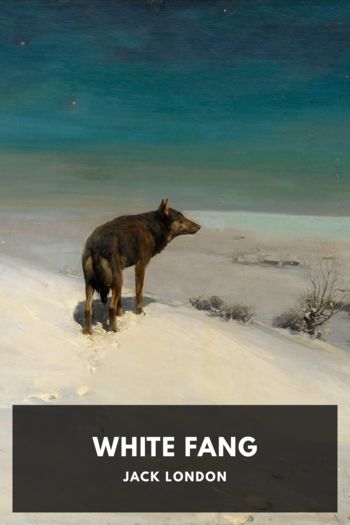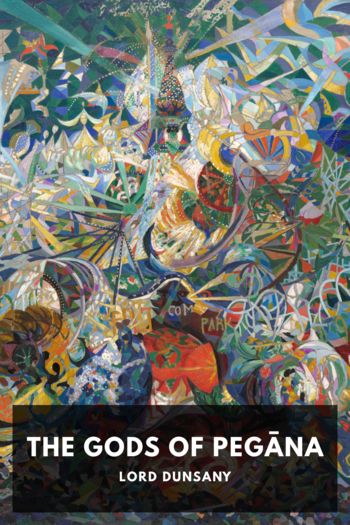White Fang - Jack London (read a book .TXT) 📗

- Author: Jack London
Book online «White Fang - Jack London (read a book .TXT) 📗». Author Jack London
Sometimes this stroke was successful, and a stricken dog rolled in the dirt, to be pounced upon and torn to pieces by the pack of Indian dogs that waited. White Fang was wise. He had long since learned that the gods were made angry when their dogs were killed. The white men were no exception to this. So he was content, when he had overthrown and slashed wide the throat of one of their dogs, to drop back and let the pack go in and do the cruel finishing work. It was then that the white men rushed in, visiting their wrath heavily on the pack, while White Fang went free. He would stand off at a little distance and look on, while stones, clubs, axes, and all sorts of weapons fell upon his fellows. White Fang was very wise.
But his fellows grew wise in their own way; and in this White Fang grew wise with them. They learned that it was when a steamer first tied to the bank that they had their fun. After the first two or three strange dogs had been downed and destroyed, the white men hustled their own animals back on board and wrecked savage vengeance on the offenders. One white man, having seen his dog, a setter, torn to pieces before his eyes, drew a revolver. He fired rapidly, six times, and six of the pack lay dead or dying—another manifestation of power that sank deep into White Fang’s consciousness.
White Fang enjoyed it all. He did not love his kind, and he was shrewd enough to escape hurt himself. At first, the killing of the white men’s dogs had been a diversion. After a time it became his occupation. There was no work for him to do. Grey Beaver was busy trading and getting wealthy. So White Fang hung around the landing with the disreputable gang of Indian dogs, waiting for steamers. With the arrival of a steamer the fun began. After a few minutes, by the time the white men had got over their surprise, the gang scattered. The fun was over until the next steamer should arrive.
But it can scarcely be said that White Fang was a member of the gang. He did not mingle with it, but remained aloof, always himself, and was even feared by it. It is true, he worked with it. He picked the quarrel with the strange dog while the gang waited. And when he had overthrown the strange dog the gang went in to finish it. But it is equally true that he then withdrew, leaving the gang to receive the punishment of the outraged gods.
It did not require much exertion to pick these quarrels. All he had to do, when the strange dogs came ashore, was to show himself. When they saw him they rushed for him. It was their instinct. He was the Wild—the unknown, the terrible, the ever-menacing, the thing that prowled in the darkness around the fires of the primeval world when they, cowering close to the fires, were reshaping their instincts, learning to fear the Wild out of which they had come, and which they had deserted and betrayed. Generation by generation, down all the generations, had this fear of the Wild been stamped into their natures. For centuries the Wild had stood for terror and destruction. And during all this time free licence had been theirs, from their masters, to kill the things of the Wild. In doing this they had protected both themselves and the gods whose companionship they shared.
And so, fresh from the soft southern world, these dogs, trotting down the gangplank and out upon the Yukon shore had but to see White Fang to experience the irresistible impulse to rush upon him and destroy him. They might be town-reared dogs, but the instinctive fear of the Wild was theirs just the same. Not alone with their own eyes did they see the wolfish creature in the clear light of day, standing before them. They saw him with the eyes of their ancestors, and by their inherited memory they knew White Fang for the wolf, and they remembered the ancient feud.
All of which served to make White Fang’s days enjoyable. If the sight of him drove these strange dogs upon him, so much the better for him, so much the worse for them. They looked upon him as legitimate prey, and as legitimate prey he looked upon them.
Not for nothing had he first seen the light of day in a lonely lair and fought his first fights with the ptarmigan, the weasel, and the lynx. And not for nothing had his puppyhood been made bitter by the persecution of Lip-lip and the whole puppy pack. It might have been otherwise, and he would then have been otherwise. Had Lip-lip not existed, he would have passed his puppyhood with the other puppies and grown up more doglike and with more liking for dogs. Had Grey Beaver possessed the plummet of affection and love, he might have sounded the deeps of White Fang’s nature and brought up to the surface all manner of kindly qualities. But these things had not been so. The clay of White Fang had been moulded until he became what he was, morose and lonely, unloving and ferocious, the enemy of all his kind.
II The Mad GodA small number of white men lived in Fort Yukon. These men had been long in the country. They called themselves Sourdoughs, and took great pride in so classifying themselves. For other men, new in the





Comments (0)